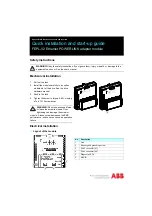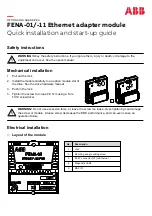
© Danfoss | DCS (MWA) | 2017.02
DKRCI.PI.IB0.A9.ML | 520H1621 | 2
DANSK
Installation
Kølemidler
Anvendelig til HCFC, HFC, R717
(ammoniak) og R744 (CO
2
)
Brændbare kulbrinter anbefales ikke.
Ventilen bør kun bruges i lukkede kredsløb.
Kontakt venligst Danfoss, hvis du ønsker
flere oplysninger.
Kompatibiliteten mellem medie, ventilhus
og det respektive tætningsmateriale skal
overholde Danfoss specifikation. I tvivl;
brug Danfoss Coolselector eller kontakt
Danfoss.
Temperaturområde
Driftsområde:
-50°C til + 100°C (-58°F til +212° F)
-50°C til -30°C (-58°F til -22°F) :
Fuld tæthed er kun garanteret, når trykket
er mindre eller lig med 0,5 x P
set
.
Trykområde
SFV 20/25: 25 bar g (362 psi g).
SFA 15/15-50: 40 bar g (580 psi g).
Danfoss Industrial Refrigeration A/S
leverer sikkerhedsventiler, der er justeret
til at kunne klare et vist tryk (angivet på
ID-pladen) og forsejlet. Danfoss Industrial
Refrigeration garanterer et korrekt tryk, så
længe sejlet ikke er brudt.
Ventilen skal installeres med fjederhuset
i oprejst position (fig. 1). Når sikkerheds-
ventilen installeres, er det vigtigt at undgå
termisk og dynamisk tryk (vibrationer) (fig.
2). Ventilens afgangsrør skal konstrueres
således, at der ikke kan trænge snavs ind i
ventilen (fig. 3).
Et U-rør fyldt med olie beskytter effektivt
mod, at vand og snavs trænger ind, i
tilfælde, hvor ventilernes afgangsrør fører
ud til omgivelserne (fig. 4).
Ventilen er konstrueret til at kunne modstå
et højt indre tryk. Uanset hvilket system,
der er tale om, skal det være konstrueret
til at undgå væskefælder og reducere
risikoen for hydraulisk tryk forårsaget af
termisk ekspansion. Sørg for, at ventilen
er beskyttet mod kortvarige tryk såsom
“væskeslag” i systemet.
Svejsning
Hvis svejsefittings anvendes, bør disse
afmonteres, mens der svejses (fig. 5).
Kun materialer og svejsemetoder, der er
kompatible med flangens materialer, kan
bruges til svejsning på flangen.
Undgå svejserester og snavs i husets og
rørenes gevind.
Montering
Fjern svejserester og snavs fra rør og huset,
før ventilerne monteres. Monter ventilerne
som vist i fig. 6.
Efter installation og under drift, må
eventuelle tilsluttede rør kun tilsluttes
uden kraft og moment.
Farver og identifikation
Ventilerne er belagt med zink-krom fra
fabrikkens side. Hvis der er behov for
yderligere rustbeskyttelse, kan ventilerne
males.
Nøjagtig identificering af ventilen udføres
ved hjælp af ID-pladen på ventilhuset.
Kontakt Danfoss i tilfælde af tvivl.
Danfoss påtager sig intet ansvar for fejl eller mangler.
Danfoss Industrial Refrigeration forbeholder sig ret til at
ændre produkter og specifikationer uden forudgående
varsel.
ENGLISH
Installation
Refrigerants
Applicable to HCFC, HFC, R717 (Ammonia)
and R744 (CO
2
).
Flammable hydrocarbons are not
recommended. The valve is only
recommended for use in closed circuits. For
further information please contact Danfoss.
The compatibility between medium,
housing and respective sealing material
must comply with Danfoss specification. In
doubt; use Danfoss Coolselector or contact
Danfoss.
Temperature range
Operation range:
–50°C to +100°C (-58°F to +212°F)
–50°C to -30°C (-58°F to -22°F):
Full tightness only guaranteed when the
pressure is less or equal to 0.5 x P
set
.
Pressure range
SFV 20/25: 25 bar g (362 psi g).
SFA 15/15-50: 40 bar g (580 psi g).
Danfoss Industrial Refrigeration A/S is
supplying safety valves adjusted for a
certain pressure (indicated on the ID-plate)
and sealed. Danfoss Industrial Refrigeration
guarantees correct pressure as long as the
seal remains unbroken.
The valve should be installed with the
spring housing upwards (fig. 1). By
mounting of the safety valve it is important
to avoid the influence of thermic and
dynamic stress (vibrations) (fig. 2). The
outlet pipe of the valve must be designed
as to prevent dirt from penetrating into the
valve (fig. 3).
For valves with outlet in the open air, an
oil filled U-pipe is an effecient protection
against the entrance of water and dirt (fig. 4).
The valve is designed to withstand a high
internal pressure. However, the piping
system should be designed to avoid liquid
traps and reduce the risk of hydraulic
pressure caused by thermal expansion. It
must be ensured that the valve is protected
from pressure transients like “liquid
hammer” in the system.
Welding
If welding fittings are applied, these
should be dismounted during the welding
process (fig. 5). Only materials and welding
methods, compatible with the flange
material, must be welded to the flange.
Avoid welding debris and dirt in the
threads of the housing and pipes.
Assembly
Remove welding slag and dirt from tubes
and housing before the valve is mounted.
Mount the valve as shown in fig. 6.
After installation and when operating, any
connected pipes must only be connected
force and torque free.
Colours and identification
The valves are Zinc-Chromated in the
factory. If further corrosion protection
is required, it can be painted. Precise
identification of the valve is made via the
ID-plate on the valve housing.
In cases of doubt, please contact Danfoss.
Danfoss accepts no responsibility for errors and
omissions. Danfoss Industrial Refrigeration reserves the
right to make changes to products and specifications
without prior notice.






















